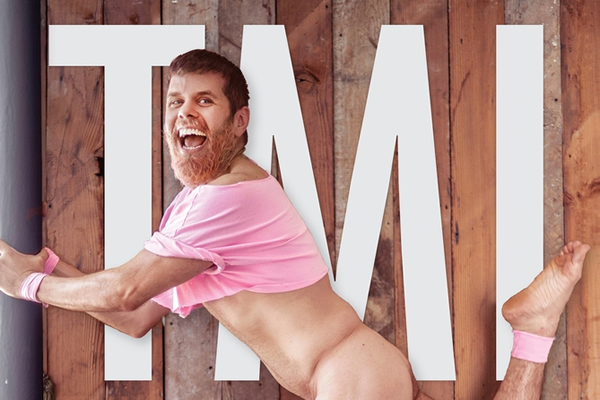Books
Perez Hilton seeks forgiveness
New biography chronicles shift from gossip to fatherhood


‘TMI: My Life in Scandal’
By Perez Hilton
c.2020, Chicago Review Press
$26.99/229 pages
You’re allowed to change your mind.
You grow, get a few experiences under your belt, and things might look a bit different. You can have a change of heart then, and pivot your life in a different direction. You can take do-overs and take-backs, but carefully. And as in the new book “TMI” by Perez Hilton (with Leif Eriksson and Martin Svensson), you can ask for forgiveness, too.
If you knew Mario Armando Lavandiera Jr. when he was a child, you’d be surprised at the man he is today. He says he had a good childhood but he was a “different” kid then, and was often bullied: among other indignities, his classmates called him “the Fat Kid” because he loved to eat.
That last part hasn’t changed. What has is that Lavandiera is now thinner, famous, and known by a nicer name: Perez Hilton. And no, if you’re wondering, Paris Hilton “never bothered” to sue him over the lookalike name, “though she definitely could have.”
This transformation didn’t happen overnight.
By the time he moved to New York to attend college, Hilton knew for sure that he was gay; while there, he gained friends, a pile of debt, and a mitt full of credit cards. Down but not out, he started a series of jobs and launched a series of websites that both spanned time in New York and L.A., and that got him into trouble in one way or another. Then a photogra-friend leaked a few celeb pictures his way, Perez posted them on his website, and he was famous, literally overnight.
And that was good – for a while. Hilton partied near-constantly, busted into celebrity events, became “wifey” with Gaga, clubbed with Jessica Simpson, and hung with Paris Hilton. And then he made a video for a national cause that caused him to see the hurt he’d left.
Could it be that the infamous author and gossip blogger Perez Hilton has softened?
Yes, mostly. There’s a whole lot less venom inside “TMI” than you might expect from Hilton, but fans won’t be entirely bereft. There’s still a little spark of gossip here, names dropped, and stories propped up and left on the roadside for embarrassment or for examination. Those are accompanied in this memoir by a glint-in-his-eye tone, and the sneakiest of snark hidden here and there, but that’s often tendered by tenderness.
The surprise – or the shock, depending on your level of fandom – is that Hilton apologizes to several people he feels he hurt; and he expresses a degree of regret for having lost good, close friends because he reported gossip about them despite the friendship. It’s contrition that feels like it came from a battered schoolyard bully, only genuine.
Hilton is a father now and he writes with unabashed love for his kids, from a refreshing, seemingly happier place in his life. “TMI” still includes plenty of Hiltonized Too Much Information, some snickers, and a hint of tattle-tale, but if you’ve never been much of a fan, here’s a chance to change your mind.
Books
Embracing the chaos can be part of the fun
‘Make Sure You Die Screaming’ offers many twists and turns

‘Make Sure You Die Screaming’
By Zee Carlstrom
c.2025, Random House
$28/304 pages
Sometimes, you just want to shut the door and forget what’s on the other side.
You could just wipe it from your memory, like it didn’t occur. Or create an alternate universe where bad things never happen to you and where, as in the new novel “Make Sure You Die Screaming” by Zee Carlstrom, you can pretend not to care.

Their mother called them “Holden,” but they’d stopped using that name and they hadn’t decided what to use now. What do you call an alcoholic, queer, pessimistic former ad executive who’s also “The World’s First Honest White Man,” although they no longer identify as a man? It’s a conundrum that they’ll have to figure out soon because a cop’s been following them almost since they left Chicago with Yivi, their psychic new best friend.
Until yesterday, they’d been sleeping on a futon in some lady’s basement, drinking whatever Yivi mixed, and trying not to think about Jenny. They killed Jenny, they’re sure of it. And that’s one reason why it’s prudent to freak out about the cop.
The other reason is that the car they’re driving was stolen from their ex-boyfriend who probably doesn’t know it’s gone yet.
This road trip wasn’t exactly well-planned. Their mother called, saying they were needed in Arkansas to find their father, who’d gone missing so, against their better judgment, they packed as much alcohol as Yivi could find and headed south. Their dad had always been unique, a cruel man, abusive, intractable; he suffered from PTSD, and probably another half-dozen acronyms, the doctors were never sure. They didn’t want to find him, but their mother called…
It was probably for the best; Yivi claimed that a drug dealer was chasing her, and leaving Chicago seemed like a good thing.
They wanted a drink more than anything. Except maybe not more than they wanted to escape thoughts of their old life, of Jenny and her death. And the more miles that passed, the closer they came to the end of the road.
If you think there’s a real possibility that “Make Sure You Die Screaming” might run off the rails a time or three, you’re right. It’s really out there, but not always in a bad way. Reading it, in fact, is like squatting down in a wet, stinky alley just after the trash collector has come: it’s filthy, dank, and profanity-filled. Then again, it’s also absurd and dark and philosophical, highly enjoyable but also satisfying and a little disturbing; Palahniuk-like but less metaphoric.
That’s a stew that works and author Zee Carlstrom stirs it well, with characters who are sardonic and witty while fighting the feeling that they’re unredeemable losers – which they’re not, and that becomes obvious.
You’ll see that all the way to one of the weirdest endings ever.
Readers who can withstand this book’s utter confusion by remembering that chaos is half the point will enjoy taking the road trip inside “Make Sure You Die Screaming.”
Just buckle up tight. Then shut the door, and read.
The Blade may receive commissions from qualifying purchases made via this post.
Books
Two new books on dining out LGBTQ-style
Visit nightclubs, hamburger joints, and a bathhouse that feeds customers

‘What is Queer Food? How We Served a Revolution’
By John Birdsall
c.2025, W.W. Norton
$29.99/304 pages
‘Dining Out: First Dates, Defiant Nights, and Last Call Disco Fries at America’s Gay Restaurants’
By Erik Piepenburg
c.2025, Grand Central
$30/352 pages
You thought a long time about who sits where.
Compatibility is key for a good dinner party, so place cards were the first consideration; you have at least one left-hander on your guest list, and you figured his comfort into your seating chart. You want the conversation to flow, which is music to your ears. And you did a good job but, as you’ll see with these two great books on dining LGBTQ-style, it’s sometimes not who sits where, but whose recipes were used.
When you first pick up “What is Queer Food?” by John Birdsall, you might miss the subtitle: “How We Served a Revolution.” It’s that second part that’s important.

Starting with a basic gay and lesbian history of America, Birdsall shows how influential and (in)famous 20th century queer folk set aside the cruelty and discrimination they received, in order to live their lives. They couldn’t speak about those things, he says, but they “sat down together” and they ate.
That suggested “a queer common purpose,” says Birdsall. “This is how who we are, dahling, This is how we feed our own. This is how we stay alive.”
Readers who love to cook, bake or entertain, collect cookbooks, or use a fork will want this book. Its stories are nicely served, they’re addicting, and they may send you in search of cookbooks you didn’t know existed.
Sometimes, though, you don’t want to be stuck in the kitchen, you want someone else to bring the grub. “Dining Out” by Erik Piepenburg is an often-nostalgic, lively look at LGBTQ-friendly places to grab a meal – both now and in the past.

In his introduction, Piepenburg admits that he’s a journalist, “not a historian or an academic,” which colors this book, but not negatively. Indeed, his journeys to “gay restaurants” – even his generous and wide-ranging definitions of the term – happily influence how he presents his narrative about eateries and other establishments that have fed protesters, nourished budding romances, and offered audacious inclusion.
Here, there are modern tales of drag lunches and lesbian-friendly automats that offered “cheap food” nearly a century ago. You’ll visit nightclubs, hamburger joints, and a bathhouse that feeds customers on holidays. Stepping back, you’ll read about AIDS activism at gay-friendly establishments, and mostly gay neighborhood watering holes. Go underground at a basement bar; keep tripping and meet proprietors, managers, customers and performers. Then take a peek into the future, as Piepenburg sees it.
The locales profiled in “Dining Out” may surprise you because of where they can be found; some of the hot-spots practically beg for a road trip.
After reading this book, you’ll feel welcome at any of them.
If these books don’t shed enough light on queer food, then head to your favorite bookstore or library and ask for help finding more. The booksellers and librarians there will put cookbooks and history books directly in your hands, and they’ll help you find more on the history and culture of the food you eat. Grab them and you’ll agree, they’re pretty tasty reads.
The Blade may receive commissions from qualifying purchases made via this post.

You’re going to be on your feet a lot this month.
Marching in parades, dancing in the streets, standing up for people in your community. But you’re also likely to have some time to rest and reflect – and with these great new books, to read.
First, dip into a biography with “Marsha: The Joy and Defiance of Marsha P. Johnson” by Tourmaline (Tiny Rep Books, $30), a nice look at an icon who, rumor has it, threw the brick that started a revolution. It’s a lively tale about Marsha P. Johnson, her life, her activism before Stonewall and afterward. Reading this interesting and highly researched history is a great way to spend some time during Pride month.
For the reader who can’t live without music, try “The Dad Rock That Made Me a Woman” by Niko Stratis (University of Texas Press, $27.95), the story of being trans, searching for your place in the world, and finding it in a certain comfortable genre of music. Also look for “The Lonely Veteran’s Guide to Companionship” by Bronson Lemer (University of Wisconsin Press, $19.95), a collection of essays that make up a memoir of this and that, of being queer, basic training, teaching overseas, influential books, and life.
If you still have room for one more memoir, try “Walk Like a Girl” by Prabal Gurung (Viking, $32.00). It’s the story of one queer boy’s childhood in India and Nepal, and the intolerance he experienced as a child, which caused him to dream of New York and the life he imagined there. As you can imagine, dreams and reality collided but nonetheless, Gurung stayed, persevered, and eventually became an award-winning fashion designer, highly sought by fashion icons and lovers of haute couture. This is an inspiring tale that you shouldn’t miss.
No Pride celebration is complete without a history book or two.
In “Trans History: From Ancient Times to the Present Day” by Alex L. Combs & Andrew Eakett ($24.99, Candlewick Press), you’ll see that being trans is something that’s as old as humanity. One nice part about this book: it’s in graphic novel form, so it’s lighter to read but still informative. Lastly, try “So Many Stars: An Oral History of Trans, Nonbinary, Genderqueer, and Two-Spirit People of Color” by Caro De Robertis (Algonquin Books of Chapel Hill. $32.00) a collection of thoughts, observations, and truths from over a dozen people who share their stories. As an “oral history,” you’ll be glad to know that each page is full of mini-segments you can dip into anywhere, read from cover to cover, double-back and read again. It’s that kind of book.
And if these six books aren’t enough, if they don’t quite fit what you crave now, be sure to ask your favorite bookseller or librarian for help. There are literally tens of thousands of books that are perfect for Pride month and beyond. They’ll be able to determine what you’re looking for, and they’ll put it directly in your hands. So stand up. March. And then sit and read.
-

 Sports5 days ago
Sports5 days agoTrans cyclist’s victory sparks outrage in conservative media
-

 Israel5 days ago
Israel5 days agoActivist recalls experience in Tel Aviv after Israel-Iran war began
-

 Movies4 days ago
Movies4 days agoTwo new documentaries highlight trans history
-

 Real Estate4 days ago
Real Estate4 days agoCelebrate the power of homeownership this Fourth of July












